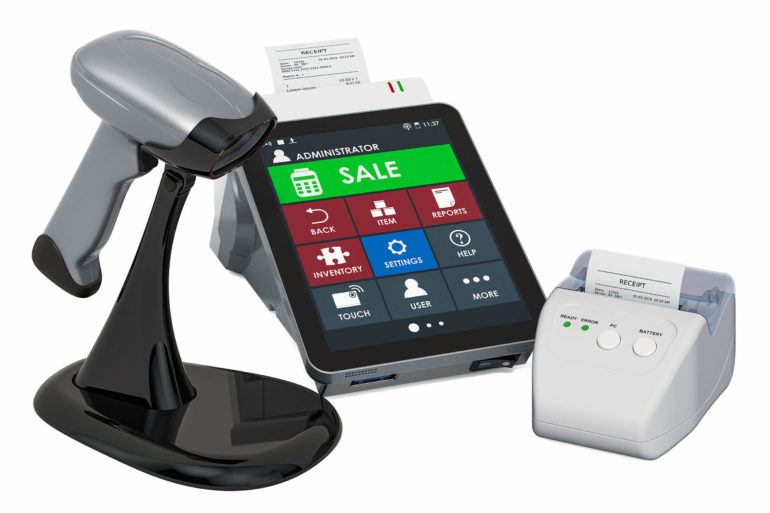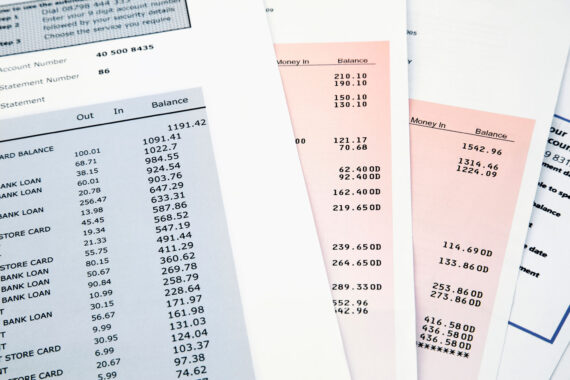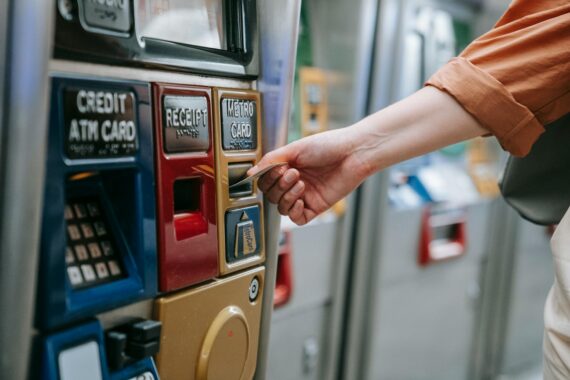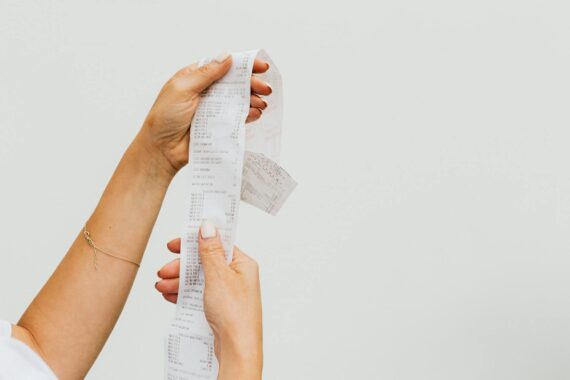Point-of-sale systems have come a long way, from the early cash registers with software to modern-day digital platforms. However, before we dive into the capabilities of these systems, we need to explain what is a POS system in depth. For a merchant, it’s extremely important to understand what is a point-of-sale system to be able to choose the right one.
What Is a POS System?
A point-of-sale or a POS system is essentially software that acts as a computer-based cash register for merchants. It can be a physical or a virtual point of sale, and it manages transactions and inventory, along with providing detailed sales reports.
Tablets and applications that let merchants use connected devices like smartphones to take payments are examples of point-of-sale (POS) technology. A point of sale can be a real device in a store or a place to check out on the web.
How Does It Work?
A POS system operates like a modern cash register that handles transactions and beyond. It calculates purchase totals, applies sales tax, processes payments, and keeps a record of each sale. Here’s how a countertop POS system typically works during a sale:
- The system adds up the total cost of items by scanning barcodes or selecting pre-programmed product buttons. It automatically calculates sales tax, applies any discounts, and can also provide customers with tipping options if available.
- Payments are then processed through the POS system’s card reader or cash drawer. For card payments, the integrated payment processing software securely transfers funds from the customer’s account to the acquiring bank.
- Once payment is completed, the system can print a receipt or send it digitally via email or text. If a loyalty program is in place, customers can be invited to join.
- The POS system logs each sale and helps maintain records for customer insights, average purchase values, and peak business hours. The data can also sync with accounting software to help with financial management.
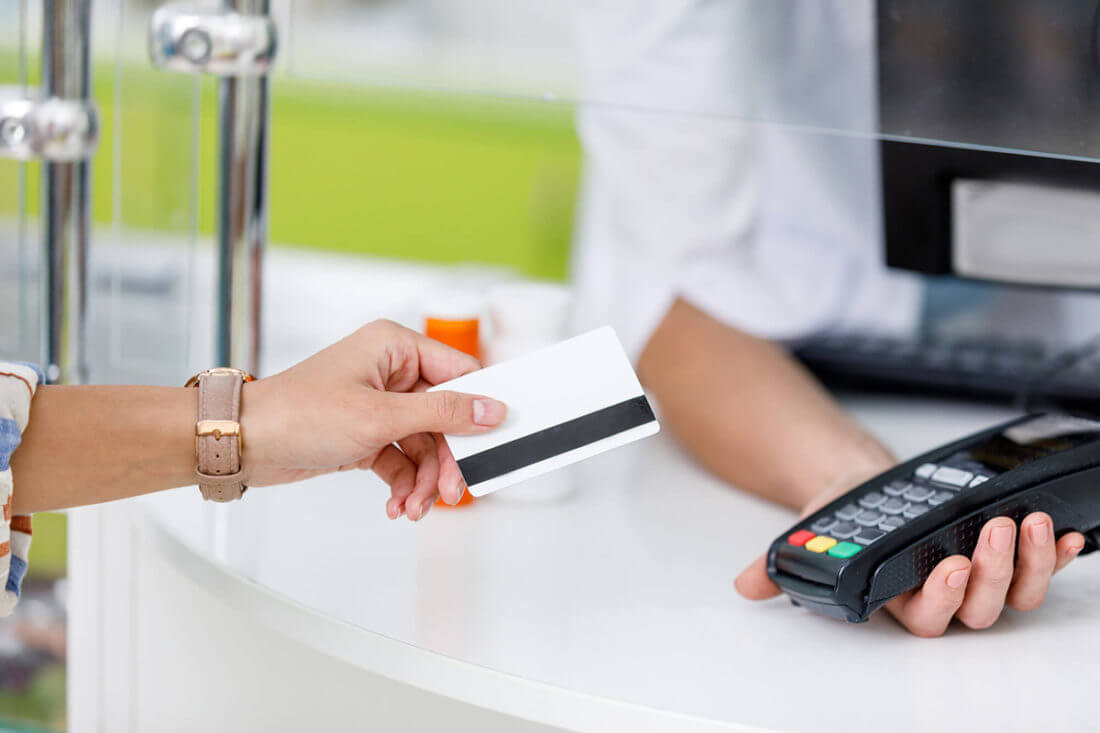
POS Hardware Options
The typical point-of-sale will consist of three main options, which include hardware, software, and payment and credit card processing. Although the hardware part is an integral part of many POS systems, it’s not always necessary. For example, an online business as opposed to a traditional one, wouldn’t need hardware. Nor is it needed for a dropshipping business. However, if a merchant requires hardware for their business, there are different options to choose from.
Countertop Terminals
Most brick-and-mortar merchants will need a complete point-of-sale setup on their countertop where their clients can line up to complete a purchase. These systems are easily distinguishable by larger screens, optional cash drawers, and built-in card readers. Some businesses don’t want to be stuck at the checkout counter and need more than just a card reader. These companies can get mobile point-of-sale (POS) systems.
Debit and Credit Card Readers
If your business is a brick-and-mortar one or you plan to do the sales in person, you will at least need a card reader that can be paired with an application on your tablet or smartphone. There are readers that work by being plugged directly into the device, while some others get connected through Bluetooth. Some of the best options out there allow swiping, tapping, or dipping debit as well as credit cards.
Self-Ordering Kiosks
Customers can submit and make payments for orders by themselves with these stand-alone systems, which frees up staff to handle other business needs. They aren’t the right choice for every business, but many quick-service places often find them useful.
Customer Displays
Some merchants find it helpful to have an additional display where the customer can see their order and payment details while the cashier works on the other side of the counter. These displays can also be used as digital tip holders that ask customers to add a set amount of money to their bill as a tip.
Kitchen Displays
Found in restaurants behind the scenes, kitchen displays serve as a replacement for paper tickets. KDS or kitchen display systems let the front desk send orders straight to a screen in the kitchen, where staff can see them, change them, and keep track of them.
Additional Accessories
POS hardware may also include some additional accessories that are not needed for every merchant. These usually include receipt and kitchen printers, barcode readers, scales, cash drawers, and label printers.
Introduction to POS Software
POS (Point of Sale) software is a vital tool for modern businesses, and it completely transformed the way sales are processed and managed. Beyond just processing transactions, POS software can track inventory, record sales data, and integrate with accounting systems. There are different types of POS software available, each suited to specific business needs and operational models.
On-Premises Point-Of-Sale Software
Also known as legacy systems, on-premises POS software is installed directly on a single terminal. It is primarily used for in-store sales, to manage credit card processing services, record sales, and track employee activity.
This type of software is ideal for small businesses with one location and fewer terminals, as it offers an easy approach for merchants focused on brick-and-mortar sales. While it may not provide the same level of flexibility as cloud-based options, it can still sync with accounting software.
Cloud-Based Point-Of-Sale Software
Cloud-based POS software offers greater flexibility by syncing data across multiple terminals and allowing access from various devices, including mobile phones and desktop computers. This type of software is well-suited for businesses with multiple locations, online stores, or mobile operations, as it enables real-time updates and easier management of sales and inventory. Leading providers like Merchant Chimp, Square, Clover, Toast, and Shopify offer cloud-based solutions that cover diverse industry needs – from retail and hospitality to e-commerce.

How to Choose a POS System
When selecting a POS system, there are some essential factors you should keep in mind. First, identify the specific features you need based on your business type, whether it’s retail or food service. Next, establish a budget that includes both initial and ongoing costs, as some systems may have lower upfront fees but higher transaction rates.
Look for an easy-to-use interface that minimizes training time and allows for quick setup, and make sure the system can integrate with your current software, like accounting and e-commerce platforms. Also, strong customer support options, including phone and live chat, are very important for addressing issues promptly. Finally, look for security features as an integral addition to protect customer information.
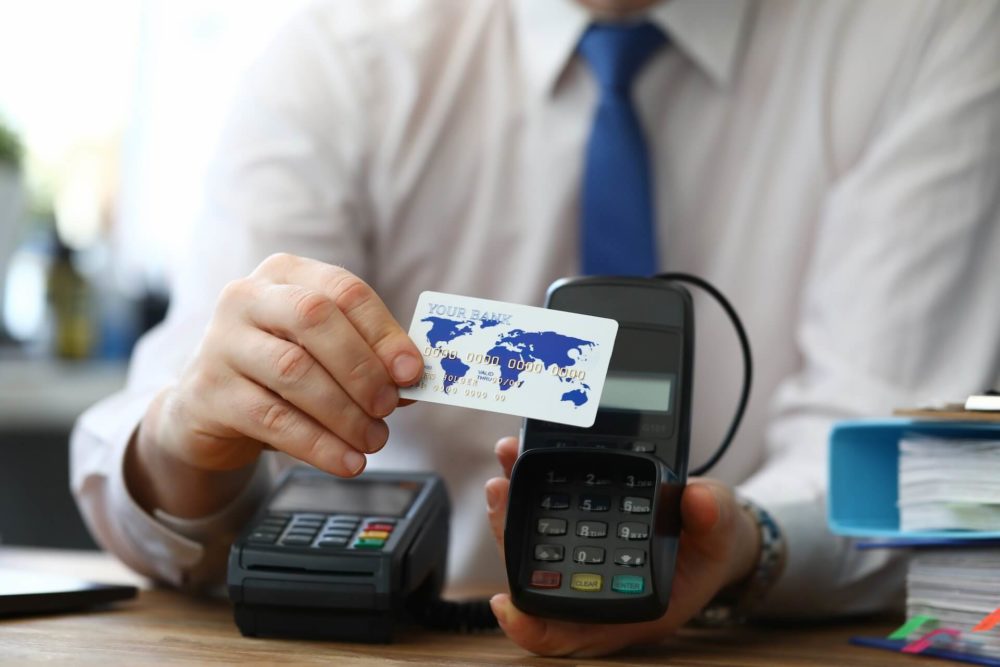
How Can Merchants Prevent Fraud at POS
To combat fraud at the point of sale, merchants can implement several security measures. A common approach is requiring customer verification during transactions. For in-store debit card purchases, customers are usually prompted to enter their personal identification number (PIN) to authorize the payment. For online or phone purchases, retailers often request the card’s CVV (Card Verification Value) code, found on the back of the payment card.
Reporting Suspicions at POS
If consumers suspect fraud at a POS terminal, they can report it through various channels. The Federal Trade Commission (FTC) operates the Consumer Sentinel Network, a database where consumers can file fraud complaints. This platform collects reports from consumers, law enforcement agencies, industry members, and non-profit organizations.
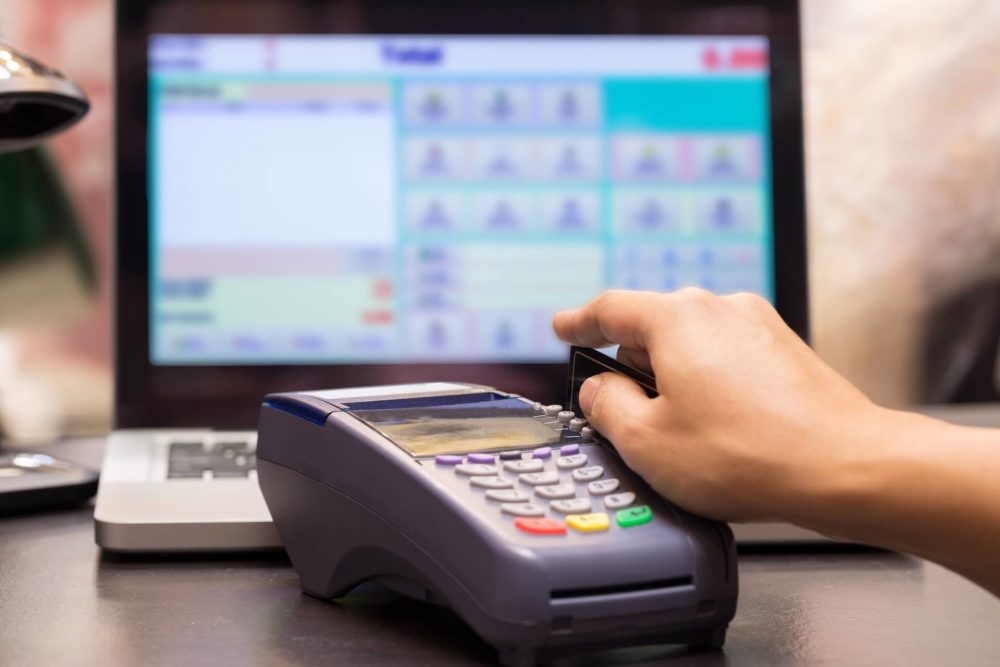
The Value of a Modern POS System
POS systems have changed from simple cash registers to complex tools that can be used in many different industries with their specific features, the ability to make reports, and easy integrations. Modern point-of-sale (POS) systems make it easier to handle inventory and sales and help with team management and data analytics, which further helps merchants make smart choices.
POS systems also have important security features, like customer verification procedures, that help stop fraud. If you’re looking for a reliable card processor and merchant service provider, Merchant Chimp is the only company focused on helping you save money. Contact us to inquire about our reliable merchant services, discount program, and credit card processing.

